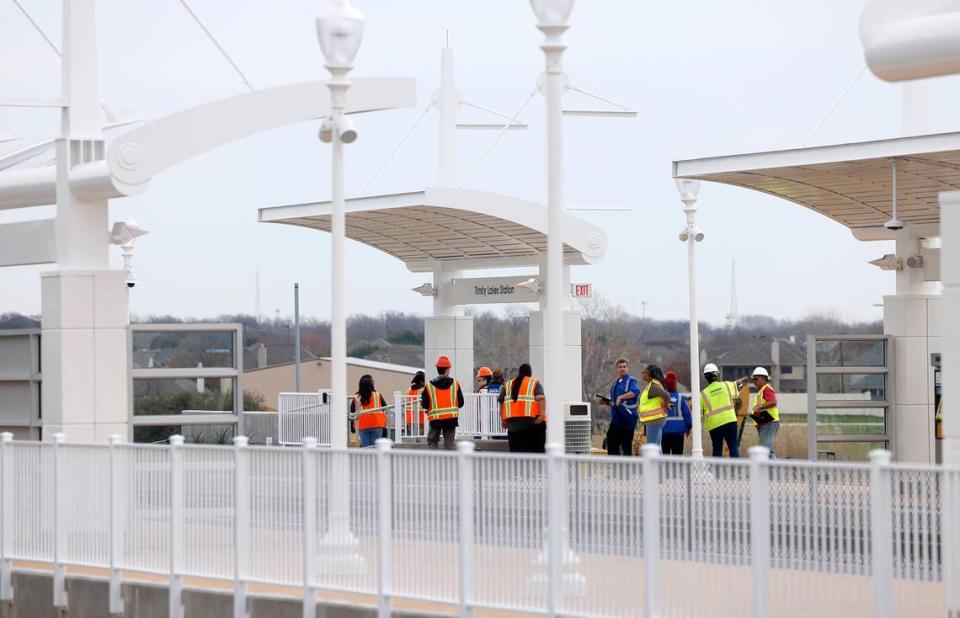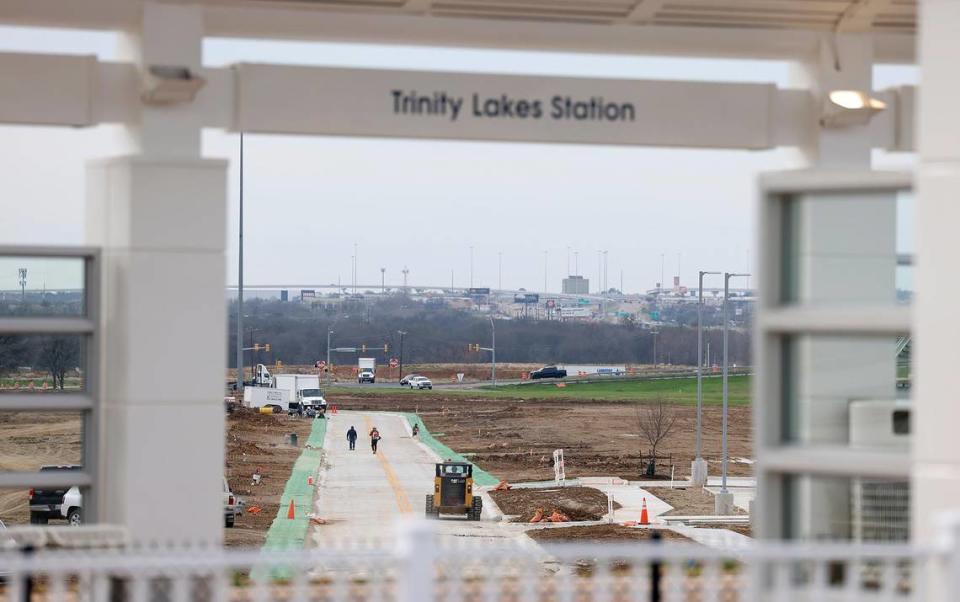TRE has a new train stop in Fort Worth. Will it spur major growth on this side of city?
Around noon on Saturday, a few dozen Dallas Stars fans bundled in parkas and victory green jerseys huddled together on the Trinity Railway Express platform in Richland Hills.
The Stars’ 4-3 defeat a few hours later wouldn’t be the only loss they witnessed that day: the shivering fans were among the last commuters to board a TRE train at the station before it permanently shuttered that evening.
Seven years ago, Richland Hills residents voted to remove the city from Trinity Metro’s jurisdiction, ultimately precipitating the station’s closure last weekend. On Monday, its multimillion dollar replacement called Trinity Lakes opened about a five minute’s drive northeast.
Officials hope the long-awaited station will anchor commercial and residential development in a burgeoning section of Fort Worth’s northeast, in ways its predecessor failed to.

Today's top stories:
→ Crips member sentenced for murder in death of gang rival
→ Father of innocent bystander killed in police chase sues city of Fort Worth
→ Texas Monthly lists 2 from Fort Worth among Best New Restaurants
🚨Get free alerts when news breaks.
All aboard
Jerry Gray was the only passenger on the Trinity Lakes platform as the eastbound train eased to a stop on fresh tracks around 8:45 a.m. Monday.
The 40-year-old Air Force veteran started law school in Dallas in August. Every weekday since, he’d driven from his home in Keller to Richland Hills, hopped on the TRE for a roughly 45 minute journey east, disembarked at EBJ Union Station, transferred to a DART train, rode three stops towards downtown, and walked to campus (repeating the process in reverse once his lectures ended). The multi-leg journey is, by his calculus, less demanding on his wallet and sanity than driving directly to and from Dallas each day.
“It looks nice,” he said of the new station with a grin. “It’s a bit farther from home.”
The Trinity Lakes stop is tucked behind the intersection of Texas 121 and Loop 820, sandwiched between a row of industrial garages and tracts of dusty, largely empty land. Trinity Metro officials say the agency finished the project for about 10% less than its $26 million estimated cost.
The road connecting Trinity Boulevard to the station parking lot is not yet charted on Google or Apple Maps (Trinity Metro says it’s working to fix the issue). Only one of its tracks was open during its debut — east and westbound trains shared it. When the second track will open is unclear.
The first TRE trains began rumbling through the eastern half of the Metroplex in 1996. The commuter rail service gradually expanded the schedule and span of its network over the years. The transit authority opened the Richland Hills station, then its westernmost stop, in September 2000. TRE connected the downtowns of Dallas and Fort Worth the following December.
Gray wagers that 15 to 20 other commuters used to board the TRE with him when it departed from Richland Hills. Trinity Metro estimates that 1.1 million passengers rode the TRE last year, a roughly 300,000 rebound from a pandemic slump (but just over half of ridership levels in 2019).

A new hub?
Trucks and construction crews buzzed around the roads surrounding the new station the day it opened for service. Decades ago, miners dug up sand and gravel from much of the land that’s now the two-platform stop. Years of rainwater gradually filled a massive pit to form a nearby lake.
In late 2012, Fort Worth unveiled a multimillion dollar plan to redevelop vast tracts of land spanning from Loop 820 eastwards to Bell Spur, including the long-neglected site. The Trinity Lakes project, bankrolled through a tax-increment financing district, promises a 1,600-acre master planned community featuring town homes, parks, retail spaces and other amenities.
The Trinity Metro board greenlighted the creation of the eponymous TRE station in 2018. Fort Worth officials and developers view the line’s newest node as a centerpiece of the initiative.
“I find the idea of transit-oriented development coming to the east side thrilling,” Fort Worth council member Gyna Bivens gushed about the project in her district in 2020.
Chad Edwards, Trinity Metro’s executive vice president of strategy, planning and development, told the Star-Telegram that the new station’s location was based largely on its “close proximity to Richland Hills.”
“The site was also attractive because of the transit-oriented development that is expected to occur in the next few years,” Edwards added.
Years ago, Richland Hills leaders had similar aspirations for their TRE station.
A 2009 “transit oriented development plan” exploring economic opportunities to build around the stop envisioned a “Richland Hills TRE transit station area in which residents of nearby townhomes and apartments can take their daily walk to the station, on the way stopping to drop off their dry-cleaning, fill a prescription, enjoy a cup of coffee, and read the morning paper.”
“At the end of the day,” it continued, “they can pick up a few groceries at the corner drugstore and take a bicycle ride on one of the connections to the Trinity Greenbelt and Veloweb regional trail system.”
Richland Hills, together with Trinity Metro, kick-started the overhaul with a $2 million investment in 2011. But the picturesque streets lined with cafes and midrises displayed in planning materials never came to fruition.
Richland Hills residents, dissatisfied with their transit services, ditched Trinity Metro a few years later. Until its final days, the station remained surrounded by warehouses and truck storage yards. The closest thing resembling a restaurant was a 7/11.

